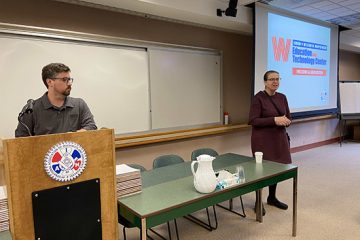In celebrating Women’s History Month, we are not only reminded of struggles women have faced in the past, but struggles that remain. When we talk about women’s issues what comes to mind are a broad range of topics; gender violence, economic equality, reproductive rights, parental leave, child care, healthcare, discrimination, underrepresentation in the political sphere, the list goes on. One issue that is overlooked and certainly stems from some of the issues named above, makes a difference between living in poverty in old and living in dignity, and that’s pensions.
Saving for retirement is a challenge for many Canadians, regardless of age. Young workers are scrambling to find stable, good paying jobs to pay off enormous student debt, and save for a home in markets that make it nearly impossible for first time home buyers to purchase a home. People with families are financially stressed and squeezed from all sides, which makes setting money aside for retirement impractical. On the whole, saving for retirement is extremely challenging.
But, did you know that for women this task is made even more difficult? Women of all ages should take note, but particularly young women because the time to think about retirement savings is now, however, difficult it may be.
For a number of reasons women need to save more for retirement. Starting from a simple fact, women live longer and therefore, need more money to retire on. On average, women need to save anywhere between 8-10% more than men. Various studies, including those from StatsCan indicate that more retired women live in poverty than men. Women rely more on basic income allowances such as Old Age Security, Guaranteed Income Supplement and the Spouse’s Allowance, which are meant to supplement, rather than provide a stable source of retirement income. And, despite relying more on pensions for a living than elderly men, an average female pensioner’s benefits are 22% less than that of retired men.
There are several factors that make saving for retirement difficult for women. Women’s employment history is different than that of men in two important ways; one is that women drop out of the labour market more often and for longer periods of time to look after their children and families. Women are also less likely to be promoted, and when they are those promotions bring less of a financial gain than when men are promoted.
Women also tend to work in “occupational ghettos”, or in certain female dominated occupations in teaching, healthcare and services, which are not well compensated. Even when women are employed in non-traditional jobs, and occupy the same job as men, they earn less than their male counterparts. Despite legislation on pay equity and employment equity, women are still underpaid and underrepresented in certain occupations, which affects women’s pension contributions.
The Canadian public pension system does not adequately address these differences, and given that most women don’t have access to workplace pension plans, leaves women in a precarious situation.
The bottom line is that the public system aims to supplement rather than replace a retirement income, and most people find it difficult to contribute to an RRSP regularly, so if there is an option to save through a workplace retirement plan, don’t disregard it. Workplace pension plans make it easy to contribute, and all of the complex investment decisions are made by professionals whose decisions are guided by a legal obligation to protect and grow your savings. Contributing to your workplace pension plan can make all the difference in retirement between living comfortably and struggling to make ends meet.
While there are an array of issues that affect women at various stages of our lives and solving them seems like a daunting task, one can easily be solved by contributing to your workplace pension plan-your financial security and dignity in retirement.
For more information on IAM pension plans, you can visit this website;
http://www.iamlmpf.ca/
Or contact your steward, business rep, or the Research Director in the Canadian Office,
Ivana Saula at this email, isaula@iamaw.org
Link to the Article from IAM Canada website: Bread, Roses, and Pensions: Why Pension Is a Woman’s Issue


